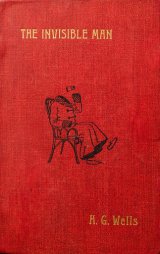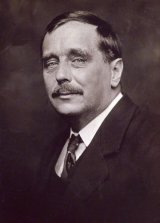The Invisible Man Page #19
The Invisible Man is a science fiction novel by H. G. Wells. Originally serialized in Pearson's Weekly in 1897, it was published as a novel the same year.
"Good Lord!" said the burly barman. "There's the back! Just watch them doors! I say--!" He looked about him helplessly. The bar-parlour door slammed and they heard the key turn. "There's the yard door and the private door. The yard door--" He rushed out of the bar. In a minute he reappeared with a carving-knife in his hand. "The yard door was open!" he said, and his fat underlip dropped. "He may be in the house now!" said the first cabman. "He's not in the kitchen," said the barman. "There's two women there, and I've stabbed every inch of it with this little beef slicer. And they don't think he's come in. They haven't noticed--" "Have you fastened it?" asked the first cabman. "I'm out of frocks," said the barman. The man with the beard replaced his revolver. And even as he did so the flap of the bar was shut down and the bolt clicked, and then with a tremendous thud the catch of the door snapped and the bar-parlour door burst open. They heard Marvel squeal like a caught leveret, and forthwith they were clambering over the bar to his rescue. The bearded man's revolver cracked and the looking-glass at the back of the parlour starred and came smashing and tinkling down. As the barman entered the room he saw Marvel, curiously crumpled up and struggling against the door that led to the yard and kitchen. The door flew open while the barman hesitated, and Marvel was dragged into the kitchen. There was a scream and a clatter of pans. Marvel, head down, and lugging back obstinately, was forced to the kitchen door, and the bolts were drawn. Then the policeman, who had been trying to pass the barman, rushed in, followed by one of the cabmen, gripped the wrist of the invisible hand that collared Marvel, was hit in the face and went reeling back. The door opened, and Marvel made a frantic effort to obtain a lodgment behind it. Then the cabman collared something. "I got him," said the cabman. The barman's red hands came clawing at the unseen. "Here he is!" said the barman. Mr. Marvel, released, suddenly dropped to the ground and made an attempt to crawl behind the legs of the fighting men. The struggle blundered round the edge of the door. The voice of the Invisible Man was heard for the first time, yelling out sharply, as the policeman trod on his foot. Then he cried out passionately and his fists flew round like flails. The cabman suddenly whooped and doubled up, kicked under the diaphragm. The door into the bar-parlour from the kitchen slammed and covered Mr. Marvel's retreat. The men in the kitchen found themselves clutching at and struggling with empty air. "Where's he gone?" cried the man with the beard. "Out?" "This way," said the policeman, stepping into the yard and stopping. A piece of tile whizzed by his head and smashed among the crockery on the kitchen table. "I'll show him," shouted the man with the black beard, and suddenly a steel barrel shone over the policeman's shoulder, and five bullets had followed one another into the twilight whence the missile had come. As he fired, the man with the beard moved his hand in a horizontal curve, so that his shots radiated out into the narrow yard like spokes from a wheel. A silence followed. "Five cartridges," said the man with the black beard. "That's the best of all. Four aces and a joker. Get a lantern, someone, and come and feel about for his body." CHAPTER XVII DR. KEMP'S VISITOR Dr. Kemp had continued writing in his study until the shots aroused him. Crack, crack, crack, they came one after the other. "Hullo!" said Dr. Kemp, putting his pen into his mouth again and listening. "Who's letting off revolvers in Burdock? What are the asses at now?" He went to the south window, threw it up, and leaning out stared down on the network of windows, beaded gas-lamps and shops, with its black interstices of roof and yard that made up the town at night. "Looks like a crowd down the hill," he said, "by 'The Cricketers,'" and remained watching. Thence his eyes wandered over the town to far away where the ships' lights shone, and the pier glowed--a little illuminated, facetted pavilion like a gem of yellow light. The moon in its first quarter hung over the westward hill, and the stars were clear and almost tropically bright. After five minutes, during which his mind had travelled into a remote speculation of social conditions of the future, and lost itself at last over the time dimension, Dr. Kemp roused himself with a sigh, pulled down the window again, and returned to his writing desk. It must have been about an hour after this that the front-door bell rang. He had been writing slackly, and with intervals of abstraction, since the shots. He sat listening. He heard the servant answer the door, and waited for her feet on the staircase, but she did not come. "Wonder what that was," said Dr. Kemp. He tried to resume his work, failed, got up, went downstairs from his study to the landing, rang, and called over the balustrade to the housemaid as she appeared in the hall below. "Was that a letter?" he asked. "Only a runaway ring, sir," she answered. "I'm restless to-night," he said to himself. He went back to his study, and this time attacked his work resolutely. In a little while he was hard at work again, and the only sounds in the room were the ticking of the clock and the subdued shrillness of his quill, hurrying in the very centre of the circle of light his lampshade threw on his table. It was two o'clock before Dr. Kemp had finished his work for the night. He rose, yawned, and went downstairs to bed. He had already removed his coat and vest, when he noticed that he was thirsty. He took a candle and went down to the dining-room in search of a syphon and whiskey. Dr. Kemp's scientific pursuits have made him a very observant man, and as he recrossed the hall, he noticed a dark spot on the linoleum near the mat at the foot of the stairs. He went on upstairs, and then it suddenly occurred to him to ask himself what the spot on the linoleum might be. Apparently some subconscious element was at work. At any rate, he turned with his burden, went back to the hall, put down the syphon and whiskey, and bending down, touched the spot. Without any great surprise he found it had the stickiness and colour of drying blood. He took up his burden again, and returned upstairs, looking about him and trying to account for the blood-spot. On the landing he saw something and stopped astonished. The door-handle of his own room was blood-stained. He looked at his own hand. It was quite clean, and then he remembered that the door of his room had been open when he came down from his study, and that consequently he had not touched the handle at all. He went straight into his room, his face quite calm--perhaps a trifle more resolute than usual. His glance, wandering inquisitively, fell on the bed. On the counterpane was a mess of blood, and the sheet had been torn. He had not noticed this before because he had walked straight to the dressing-table. On the further side the bedclothes were depressed as if someone had been recently sitting there.
Translation
Translate and read this book in other languages:
Select another language:
- - Select -
- 简体中文 (Chinese - Simplified)
- 繁體中文 (Chinese - Traditional)
- Español (Spanish)
- Esperanto (Esperanto)
- 日本語 (Japanese)
- Português (Portuguese)
- Deutsch (German)
- العربية (Arabic)
- Français (French)
- Русский (Russian)
- ಕನ್ನಡ (Kannada)
- 한국어 (Korean)
- עברית (Hebrew)
- Gaeilge (Irish)
- Українська (Ukrainian)
- اردو (Urdu)
- Magyar (Hungarian)
- मानक हिन्दी (Hindi)
- Indonesia (Indonesian)
- Italiano (Italian)
- தமிழ் (Tamil)
- Türkçe (Turkish)
- తెలుగు (Telugu)
- ภาษาไทย (Thai)
- Tiếng Việt (Vietnamese)
- Čeština (Czech)
- Polski (Polish)
- Bahasa Indonesia (Indonesian)
- Românește (Romanian)
- Nederlands (Dutch)
- Ελληνικά (Greek)
- Latinum (Latin)
- Svenska (Swedish)
- Dansk (Danish)
- Suomi (Finnish)
- فارسی (Persian)
- ייִדיש (Yiddish)
- հայերեն (Armenian)
- Norsk (Norwegian)
- English (English)
Citation
Use the citation below to add this book to your bibliography:
Style:MLAChicagoAPA
"The Invisible Man Books." Literature.com. STANDS4 LLC, 2025. Web. 11 Jan. 2025. <https://www.literature.com/book/the_invisible_man_138>.




Discuss this The Invisible Man book with the community:
Report Comment
We're doing our best to make sure our content is useful, accurate and safe.
If by any chance you spot an inappropriate comment while navigating through our website please use this form to let us know, and we'll take care of it shortly.
Attachment
You need to be logged in to favorite.
Log In